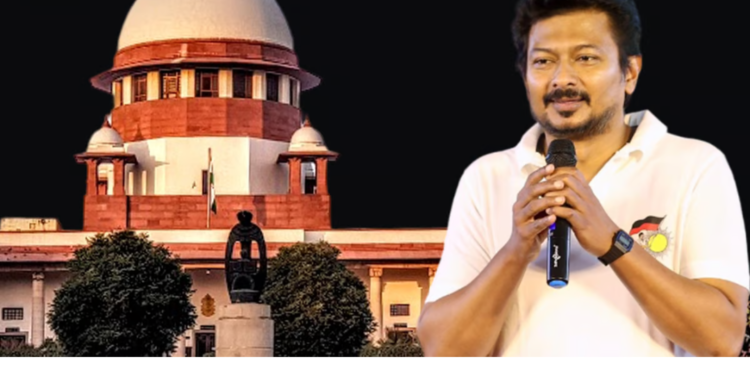On Friday, the Supreme Court issued notices to several state governments and complainants in response to a plea filed by Tamil Nadu Minister Udhayanidhi Stalin. He sought to consolidate multiple criminal cases registered against him due to his controversial remarks on Sanatana Dharma [Udhayanidhi Stalin v. State of Maharashtra and Ors].
A Bench comprising Justices Sanjiv Khanna and Dipankar Datta allowed the amendment of Stalin’s petition under Article 32 of the Constitution.
During the previous hearing, the Court raised objections to the petition being filed under Article 32 and directed Stalin to amend his plea to invoke Section 406 (power of Supreme Court to transfer cases and appeals) of the Code of Criminal Procedure (CrPC).
Stalin is currently facing legal action in various states due to his statement made during a conference in Chennai in September 2023. He remarked, “Just like dengue, mosquitoes, malaria, or coronavirus need to be eradicated, we have to eradicate Sanatana.”
Last month, the Supreme Court noted that the Dravida Munnetra Kazhagam (DMK) leader cannot equate himself with the media or news channels.
In March, the Court observed that Stalin had misused his rights under Articles 19(1)(a) (freedom of speech and expression) and 25 (freedom of conscience and free profession, practice, and propagation of religion) of the Constitution in making such remarks.
Following his speech, 262 individuals, including 14 retired High Court judges, wrote to the Supreme Court urging it to take suo motu action against Stalin.
Later, a petition was filed in the Supreme Court seeking the initiation of a criminal case against Stalin.
Meanwhile, a court in Bengaluru directed the registration of an FIR against Stalin for his comments. Additionally, a Jammu court ordered an inquiry after a litigant filed a criminal complaint.
A plea was also filed in the Madras High Court seeking Stalin’s removal from his ministerial position. Before the High Court, Stalin clarified that his statement was not against Hinduism or its practices but aimed at ending caste-based discrimination.
The Madras High Court declined to direct Stalin’s removal but criticized his remarks, calling them “divisive” and contrary to constitutional principles. The High Court cautioned that unverified claims about Sanatana Dharma amount to spreading misinformation.

















